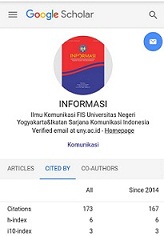Will technology take over journalism?
DOI:
https://doi.org/10.21831/informasi.v50i2.36379Abstract
References
Biswal, S. K. & Gouda, N. K. (2020). Artificial intelligence in journalism: A boon or bane? In A..J. Kulkarni, A. J., & Satapathy, S. C. (2020). Optimization in machine learning and applications. Singapore: Springer. https://doi.org/10.1007/978-981-15-0994-0_10
Brants, K. (2013). Trust, cynicism, and responsiveness. In: Peters, C & Broersma, M (eds) Rethinking journalism: Trust and participation in a transformed news landscape. London: Routledge.
Carlson, M. (2015). The robotic reporter: Automated journalism and the redefinition of labor, compositional forms, and journalistic authority. Digital Journalism 3(3). 416–431. DOI: https://doi.org/10.1080/21670811.2014.976412
Cohen, N. S., Hunter, A., & O'Donnell, P. (2019). Bearing the burden of corporate restructuring: Job loss and precarious employment in Canadian journalism. Journalism Practice, 13(7), 817-833. DOI: https://doi.org/10.1080/17512786.2019.1571937
De Mateo, R., Bergés, L., & Garnatxe, A. (2010). Crisis, what crisis? The media: business and journalism in times of crisis. tripleC: Communication, Capitalism & Critique. Open Access Journal for a Global Sustainable Information Society, 8(2), 251-274. DOI: https://doi.org/10.31269/triplec.v8i2.212
Deuze, M. (2005) What is journalism? Professional identity and ideology of journalists reconsidered. Journalism 6(4),442–464. DOI: https://doi.org/10.1177/1464884905056815
Ekdale, B., Tully, M., Harmsen, S., & Singer, J. B. (2015). Newswork within a culture of job insecurity: Producing news amidst organizational and industry uncertainty. Journalism Practice, 9(3), 383-398. DOI: https://doi.org/10.1080/17512786.2014.963376
Fink, K. (2018). The biggest challenge facing journalism: A lack of trust. Journalism 20(1): 40–43. DOI: doi.org/10.1177/1464884918807069
Franklin, B. (2012). The future of journalism: Developments and debates. Journalism Studies 13(5– 6), 663–681. DOI: https://doi.org/10.1080/1461670X.2012.712301
Hummel, R., Kirchhoff, S., & Prandner, D. (2012). "We used to be queens and now we are slaves" working conditions and career strategies in the journalistic field. Journalism Practice, 6(5-6), 722-731. DOI: https://doi.org/10.1080/17512786.2012.667276
Jones, D. A. (2004). Why Americans don't trust the media: A preliminary analysis. Harvard international journal of press/politics, 9(2), 60-75. DOI: https://doi.org/10.1177/1081180X04263461
Kiousis, S. (2001). Public trust or mistrust? Perceptions of media credibility in the information age. Mass communication & society, 4(4), 381-403. DOI: https://doi.org/10.1207/S15327825MCS0404_4
Kovach, B. & Rosenstiel, T. (2001). The elements of journalism. New York: Random House.
Kyodonews.net. (2020). AI-powered virtual news anchor comes to South Korean TV. https:// english.kyodonews.net/news/2020/11/5fc3c846c868-ai-powered-virtual-news-anchor- comes-to-s-korean-tv.html
Lewis, S. C. (2020). Lack of trust in the news media, institutional weakness, and relational journalism as a potential way forward. Journalism, 21(3), 345-348. DOI: https://doi.org/10.1177/1464884918807597
Montal, T., & Reich, Z. (2017). I, robot. You, journalist. Who is the author? Authorship, bylines and full disclosure in automated journalism. Digital Journalism, 5(7), 829-849. DOI: https://doi.org/10.1080/21670811.2016.1209083
Newman, N & Fletcher, R. (2017). Bias, bullshit and lies: Audience perspectives on low trust in the media. Report, Reuters Institute for the Study of Journalism, University of Oxford, Oxford, November. Available at: http://reutersinstitute.politics.ox.ac.uk/our-research/ bias-bullshit-and-lies-audience-perspectives-low-trust-media
Newman, N., Fletcher, R., & Kalogeropoulos, A. (2018). Reuters Institute for the study of journalism, University of Oxford. Digital News Report, Oxford: UK. Available at: https:// reutersinstitute.politics.ox.ac.uk/sites/default/files/digital-news-report-2018.pdf
Ní¶lleke, D., Maares, P., & Hanusch, F. (2020). Illusio and disillusionment: expectations met or disappointed among young journalists. Journalism, 1464884920956820. DOI: https://doi.org/10.1177/1464884920956820
Picard, R. G. (2006). Capital crisis in the profitable newspaper industry. Nieman Reports, 60(4), 10-12.
Reinardy, S. (2011). Newspaper journalism in crisis: Burnout on the rise, eroding young journalists' career commitment. Journalism, 12(1), 33-50. DOI: https://doi.org/10.1177/1464884910385188
Rosenstiel, T., & Mitchell, A. (2004). The impact of investing in newsroom resources. Newspaper Research Journal, 25(1), 84-97. DOI: https://doi.org/10.1177/073953290402500107
Russial, J., Laufer, P., & Wasko, J. (2015). Journalism in crisis? Javnost-The Public, 22(4), 299-312. DOI:10.1080/13183222.205.1091618
Seethaler, J. (2017). New worlds of journalism: How Austrian, German and Swiss journalists perceive innovation and change. Journalism report V: Innovation and transition, 53-67.
Sjí¸vaag, H. (2016). Introducing the Paywall: A case study of content changes in three online newspapers. Journalism Practice, 10(3), 304-322. DOI: https://doi.org/10.1080/17512786.2015.1017595
Techtimes.com. B., Urian. (2020). First AI news anchor in South Korea: How does it compare to China's "˜Xinhua'? source: https://www.techtimes.com/articles/254712/20201203/ai- news-anchor-south-korea-accomplishes-10-000-minutes-reporting.htm
Downloads
Published
How to Cite
Issue
Section
Citation Check
License
Authors who publish with this journal agree to the following terms:
- Authors retain copyright and grant the journal right of first publication with the work simultaneously licensed under a Creative Commons Attribution License that allows others to share the work with an acknowledgement of the work's authorship and initial publication in this journal.
- Authors are able to enter into separate, additional contractual arrangements for the non-exclusive distribution of the journal's published version of the work (e.g., post it to an institutional repository or publish it in a book), with an acknowledgement of its initial publication in this journal.
- Authors are permitted and encouraged to post their work online (e.g., in institutional repositories or on their website) prior to and during the submission process, as it can lead to productive exchanges, as well as earlier and greater citation of published work (See The Effect of Open Access).












